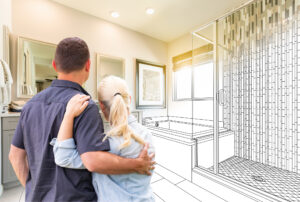How To Get Building Regulations Approval For Your Bathroom Renovation
It’s a common misconception that homeowners do not have to inform the council of building work carried out in their home. While planning permission isn’t typically required - unless you’re building or renovating a bathroom in a new extension - you may still be required to inform your council’s building control body.
Disclosure depends on what you’re doing. If you add a bathroom to a room which didn’t have one previously, for instance, you will likely need building control approval. The bathroom building regulations set out by building control ensure several requirements are met, including efficient drainage, ventilation, electrical safety, fire safety, and structural stability.
This handy guide will help you stay safe and compliant during your bathroom renovation. In addition, it’s important to understand your bathroom renovation cost. It's important to set a budget for your renovation and factor in all costs, including any necessary permits and fees from your local building control office. Keeping track of your expenses throughout the renovation process can help ensure that you stay within your budget and avoid any unexpected expenses.
However, it would be best to keep in touch with your local authority’s building control office throughout the renovation process, as well.
What is building control?
A building control body is an organisation authorised to control building work that is subject to the Building Regulations in England and Wales. In Northern Ireland and Scotland, the term ‘building standards’ is used. Building Control officers are private sector-approved inspectors who work in local councils.
Building regulations for renovating a bathroom
You will need to notify building control if you’re planning to rearrange the layout of your house, or if you plan to install a bathroom where there wasn’t one previously (e.g. when adding an ensuite to a bedroom).
Electrical regulations also apply if you decide to install lighting or other electrical products, such as an electric shower. You should also bear in mind that ensuite bathrooms cannot lead directly into a bedroom (with just one door into the bathroom) if it is the only bathroom in the house.
Ensuring the floor can bear the weight of a bathroom renovation is a crucial Building Control concern. Before starting your project, apply to your local council stating what you intend to do. Keep in mind that they may ask for a structural engineer’s report.
Bathroom electrical regulations
Part P building regulations
The introduction of Approved Document P in 2005 changed bathroom building regulations significantly. Part P covers electrical work in the bathroom, such as installing lights, underfloor heating, and electric showers. This legislation covers areas where water is likely to come into contact with electricity (i.e. bathrooms and kitchens). Remember, this work should be carried out or certified by a qualified electrician.
Part P has four main aspects:
- A competent person must carry out all electrical work
- Minor electrical works (installing electric showers; extractor fans) must be certified with a minor works certificate verified by a qualified electrician
- Quality electrical materials must be used at all times
- Bathrooms, along with wet rooms and kitchens, are considered ‘special locations’; therefore, you should notify Building Control if you’re planning electrical work in these areas
If you’re upgrading your electric shower, be sure to follow the manufacturer’s instructions. They should include any notifications required to remain compliant.
Bathroom ventilation regulations
When renovating or installing a new bathroom, an external ventilation source is imperative. If there is no window, you must ensure an extractor fan is fitted.
Building control costs
Building control is a matter covered by your local council, and the costs are not the same in every area. Typically, the costs incurred are based on the value of the proposed work. You’re likely to pay around £100 for the electrical work to be professionally checked and certified, and anywhere between £400 - £800 to relocate a bathroom.
You can check costs on your local council’s website. Many councils allow you to submit and track applications online, as well as offering online payment facilities.

























